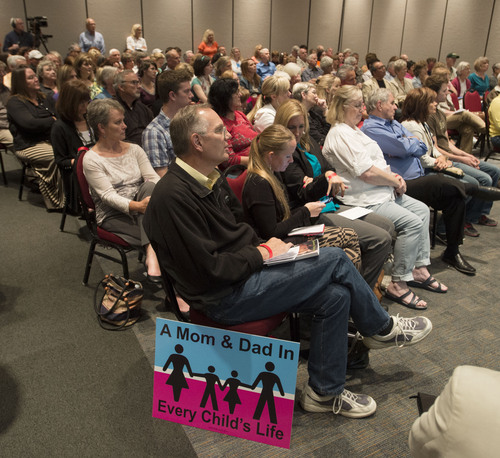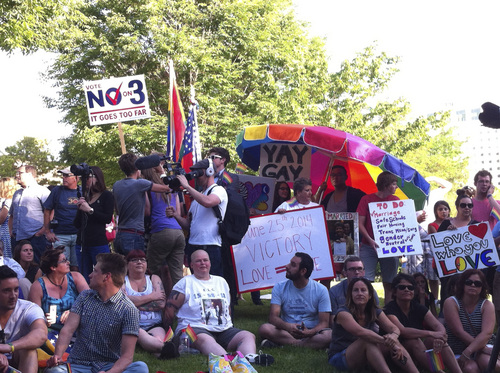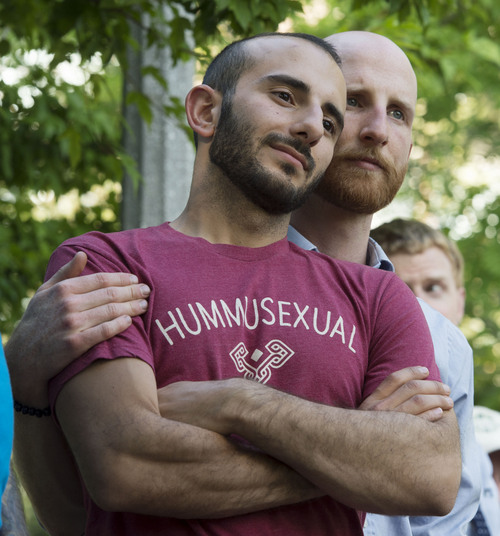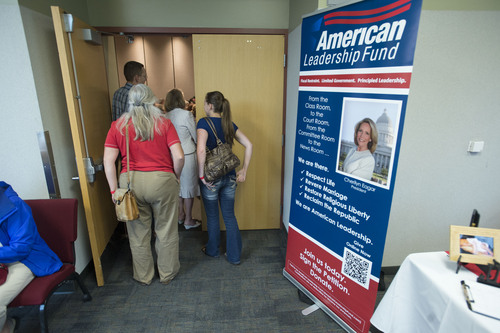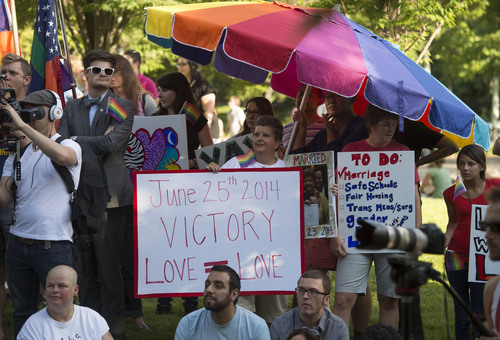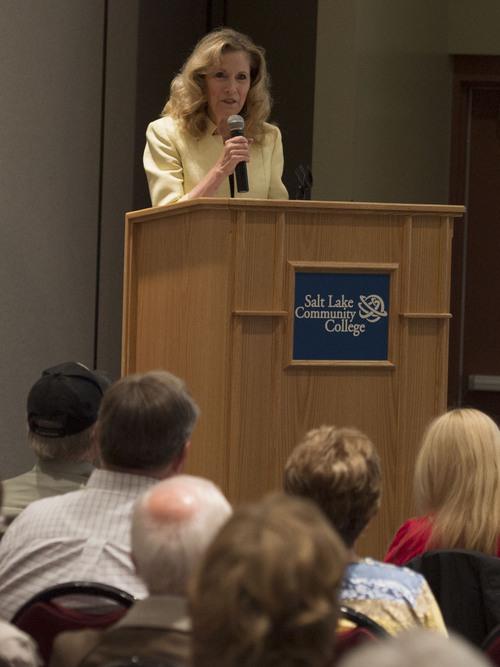This is an archived article that was published on sltrib.com in 2014, and information in the article may be outdated. It is provided only for personal research purposes and may not be reprinted.
Utah on Tuesday became the first state to ask the U.S. Supreme Court to weigh in on the issue of same-sex marriage, but it won't be the last.
Hours after the state filed a more than 200-page petition with the high court, Virginia's attorney general announced that he would soon do the same.
For Utah, it's the state's last chance to revive its voter-approved ban on gay and lesbian unions, which was found to violate the U.S. Constitution by a federal judge and, most recently, the 10th Circuit Court of Appeals.
"This case presents an immensely important question: whether the United States Constitution compels states to adopt a single marriage policy that every individual is allowed 'to marry the person of their choice,' " the state wrote. "The 10th Circuit said yes and struck down Utah's definition — statutorily enacted and adopted into the Utah Constitution by two-thirds of voters in a statewide referendum — that marriage is only between a man and a woman. That ruling deprives Utah citizens of the 'fundamental right' to 'act through a lawful electoral process' ... and ignores that the Constitution says nothing about how states must define marriage."
The Supreme Court is on break until the fall, at which point the justices will review Utah's petition and decide whether to hear the case — known as granting certiorari.
Should the court decline to hear the case and deny Utah's request, the 10th Circuit's decision would stand — effectively legalizing same-sex marriage in all of the states in that circuit: Colorado, Kansas, New Mexico, Oklahoma, Utah and Wyoming.
In its petition to the high court, Utah urged the justices to take on Utah's case expeditiously.
"The harm in waiting is significant, regardless of which side prevails," Utah wrote. "Either thousands of couples are being denied their constitutional right to marry, or millions of voters are being disenfranchised of their fundamental right to retain the definition of marriage that has existed since before the People ratified the United States Constitution."
In this brief, the state outlined the crux of its defense of Amendment 3: that states, and voters, have a fundamental right to define marriage how they see fit; that marriage is an institution created to protect the welfare of children; and that affirming the "freedom of choice to marry" supersedes state-imposed limitations could lead the nation down a slippery slope toward polygamy.
According to Utah, U.S. District Judge Robert J. Shelby — who became the first federal court judge to overturn a state ban on same-sex marriages in December — and the 10th Circuit erred in their findings because both relied on a definition of marriage that is "adult-centric."
In Utah, the state has argued, marriage is traditionally, and rightfully, defined as a family- or child-centric institution.
"Utah's laws do not classify based on [sexual] orientation; they classify based on sexual complementariness. It remains a biological fact that the creation of new life requires both a mother and a father," the state wrote. "A state's interest in marriage thus springs from a distinctive characteristic of opposite-sex relationships: the couple's sexual union can create new life."
Although the state acknowledged that not all opposite-sex marriages lead to children, Utah argued the institution itself encourages "unmarried parents to marry and married parents to remain so," keeps the rate of out-of-wedlock births down and benefits children who are raised by "both a mom and a dad."
At several points in its brief, Utah makes reference to how a declaration of marriage as a "fundamental right" might impact other marriage laws — such as those banning polygamy or imposing age restrictions on lawful unions.
"If the 10th Circuit really means that a person's choice is the only marriage limit, then virtually every line historically drawn around marriage must fail," the state wrote. "The right to marry whomever one chooses would thus override not only a limitation based on sexual complementariness, but also the usual blanket limitations based on age, consanguinity, consent or number of participants."
Last month, Utah passed up a review by all 12 judges on the 10th Circuit bench, known as an en banc review, opting instead to take its case directly to the U.S. Supreme Court.
The federal appeals court's 2-1 ruling was the first in the nation to declare that voter-approved bans on same-sex marriage violate the 14th Amendment rights of same-sex couples to equal protection and due process.
Judges Carlos F. Lucero and Jerome A. Holmes authored the court's decision, with Paul J. Kelly penning a dissent, which the state quoted in its appeal to the U.S. Supreme Court on Tuesday.
Utah's Attorney General Sean Reyes said in a statement Tuesday the case has caused "uncertainty and disruption."
"We ... have accordingly tried to expedite its resolution as quickly as possibly by filing our petition a full month-and-a-half before its September 23rd due date," Reyes said. "Utah welcomes a speedy grant of the petition and a Supreme Court merits decision, as all Utah citizens will benefit when the Supreme Court provides clear finality on the important issue of state authority to define marriage."
The attorneys for the three plaintiff couples challenging Utah's embattled Amendment 3 said Tuesday they would file a response with the U.S. Supreme Court "in due course."
"We respect the State's right to seek review of its own law in the highest Court in the land," Peggy Tomsic said in a statement. "But we also respectfully, and vehemently, disagree with the notion that States can deny one of the most foundational rights to the millions of same-sex couples living across this great land."
Lawmakers, citizens and Democratic Attorney General Candidate Charles Stormont have criticized Utah for continuing to fight the battle over Amendment 3.
"While states' rights are incredibly important, they cannot trump individual rights," Stormont said in a statement Tuesday. "The attorney general has a duty to stand up for the rights of all Utahns. In the face of overwhelming precedent, today's petition is another waste of taxpayer resources."
Reyes has repeatedly said the state's decision to defend its ban on gay and lesbian marriages stems from a belief in his responsibility to "defend the State Constitution and its amendments as Utah citizens have enacted them."
Twitter: @Marissa_Jae


